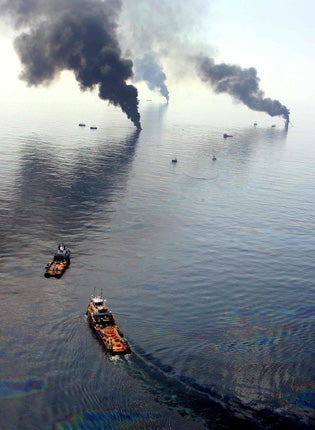BP ignored warnings and cut corners, says Congress
Oil giant's decisions 'increased danger of catastrophic well failure'

Your support helps us to tell the story
From reproductive rights to climate change to Big Tech, The Independent is on the ground when the story is developing. Whether it's investigating the financials of Elon Musk's pro-Trump PAC or producing our latest documentary, 'The A Word', which shines a light on the American women fighting for reproductive rights, we know how important it is to parse out the facts from the messaging.
At such a critical moment in US history, we need reporters on the ground. Your donation allows us to keep sending journalists to speak to both sides of the story.
The Independent is trusted by Americans across the entire political spectrum. And unlike many other quality news outlets, we choose not to lock Americans out of our reporting and analysis with paywalls. We believe quality journalism should be available to everyone, paid for by those who can afford it.
Your support makes all the difference.Leaders in the US Congress claimed last night that BP officials cut corners to save money that increased the dangers of disaster in the days and hours before the devastating oil spill in the Gulf of Mexico.
BP was accused of ignoring warnings from employees and contractors and of choosing faster and cheaper options for drilling operations. Five days before the blast, one BP engineer wrote in an email about the "nightmare well" that had "everyone all over the place".
The allegations were spelled out in a letter sent by the House Energy and Commerce Committee to BP's CEO, Tony Hayward. According to the first findings of the committee, BP seems "to have made multiple decisions for economic reasons that increased the danger of a catastrophic well failure".
It presented a potentially damning account of decisions made by the company in the run up to the accident that left 11 workers dead and the US suffering its worst oil spill. The letter suggested that BP engineers were hurrying to finish operations that were running more than 40 days late. BP chose a design with few barriers to preventing a surge of gas that triggered the accident on 20 April, the lawmakers said. BP declined to comment on the letter.
Details of the letter emerged as President Barack Obama met with fishermen and tourist industry executives yesterday to discuss containment of the spill. Last night Mr Obama made stops in Mississippi and Alabama and Florida.
Tonight, Mr Obama will use the sombre setting of the Oval Office to make a televised national address aimed at convincing a sceptical public that he is in control of the catastrophe. Presidents generally use the Oval Office setting for broadcasts at times of grave national threat.
This morning BP will also come under criticism from executives of competing energy giants who will testify on Capitol Hill. Writing in The Wall Street Journal the chief executive of Chevron, John Watson, said the accident that triggered the disaster was "preventable".
As the President flew south from Washington yesterday, White House officials voiced optimism that BP would accede to demands that it place funds in an independently managed account from which money could be disbursed to fund compensation claims and clean-up costs.
"We have begun preliminary conversations about how do we structure a mechanism so that the legitimate claims that are going to be presented ... are going to be dealt with justly, fairly, promptly," Mr Obama said on a tour of the Gulf Coast. "My hope is that by the time the chairman and I meet on Wednesday that we've made sufficient progress that we can start actually seeing a structure that would be in place," he said.
Before leaving the capital, Mr Obama told an interviewer that the BP spill would have the same kind of impact on the psyche of the American public that 9/11 did.
"In the same way that our view of our vulnerabilities and our foreign policy was shaped profoundly by 9/11," the President said, "I think this disaster is going to shape how we think about the environment and energy for many years to come."
The face-off between BP and the White House will reach a climax tomorrow when the company's chairman, Carl-Henric Svanberg, will meet Mr Obama at the White House. Mr Svanberg has been criticised from within BP for taking too low a profile in the spill, leaving most of the accident-management to CEO Tony Hayward, who is also expected to attend the talks. Members of Congress will try to make their own frustration heard as several committee hearings play out this week. Among those none will be more closely watched that the House Energy Committee hearings on Thursday when members will play to the gallery grilling Mr Hayward.
Subscribe to Independent Premium to bookmark this article
Want to bookmark your favourite articles and stories to read or reference later? Start your Independent Premium subscription today.
Join our commenting forum
Join thought-provoking conversations, follow other Independent readers and see their replies
Comments